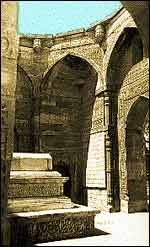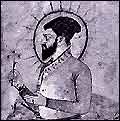

Establishment of Delhi Sultanate by Ilbari Dynasty
|
|
|
Qutbuddin Aibak |
Muizuddin Muhammad Ghuri, the last Turkish conqueror of North India, had no sons. He had bought a large number of slaves, whom he had appointed as his officers, but he did not nominate any particular one as his successor. At the time of Muhammad Ghuri’s death in 1206, Qutbuddin Aibak was in Lahore, where he assumed the sovereign powers as he was elected Sultan by the Amirs. The assumption of sovereign powers by Qutbuddin Aibak in 1206 is regarded as the foundation of the Sultanate of Delhi.
|
|
|
Qutbuddin Aibak laid the foundations of Qutb Minar |
The Sultanate of Delhi (1206-1526) had five ruling dynasties:
1. The Ilbari or slaves (1206-90)
2. The Khaljis (1290-1320)
3. The Tughluqs (1320-1413)
4. The Saiyads (1414-51)
5. The Lodhis (1451-1526)
Of these five dynasties, the first three were of Turkish origin and the Lodhis were Afghans.
Qutbuddin [1206-10]
He was a Turk of the Aibak tribe.
During his brief rule of four years, he did not make any fresh
conquests. Lahore and later Delhi were his capitals. He died in 1210
from fall from a horse while playing Polo in Lahore. For his
generosity he is known as lakh-baksh (giver of lakhs). He laid the
foundation of Qutb Minar, which was completed by his son-in-law and
successor Iltumish.
|
|
|
Shamsuddin Iltumish |
Iltumish [1210-36]
Shamsuddin Iltumish was the real founder of the Sultanate. He
secured his position in 1217 by defeating his rivals. By his
diplomatic skill, Iltumish saved his infant kingdom from the fury of
the Mongol invasion. After a series of conquests, he received a deed
of investiture from the Abassid Caliph of Baghdad.
Tomb of
Shamsuddin Iltumish But Iltumish
failed to deal conclusively with a resurgent Rajput threat early in
the 1220’s and his position was undermined in the 1230’s by Mongol
invaders who won the northern Punjab. The Turkish nobles were
reasserting themselves by the time of his death and, after a period
of chaos, one of them, Balban, seized the throne in 1265.
Balban [1266-86]
Ghiasuddin
Balban Ghiasuddin Balban organized a
strong army to face the Mongol threat and made military reforms. His
views about kingship were that kingship was second only to
prophethood. He dealt severely with the Turkish nobility to which he
had previously belonged and gave a centralized system of
administration. With his death ended the Ilbari dynasty.

